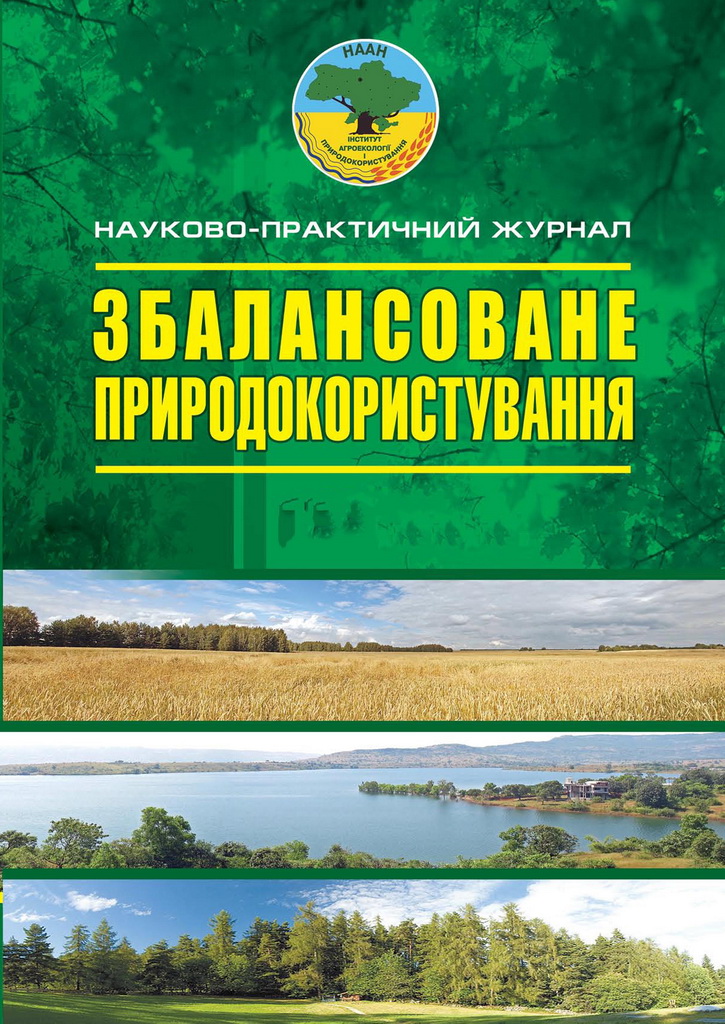СИСТЕМНА ОЦІНКА РЕЗУЛЬТАТИВНОСТІ ЕКОЛОГІЧНОГО ОПОДАТКУВАННЯ У КОНТЕКСТІ СОЦІАЛЬНО-ЕКОЛОГО- ЕКОНОМІЧНОЇ БЕЗПЕКИ ПРОСТОРОВОГО РОЗВИТКУ
DOI:
https://doi.org/10.33730/2310-4678.1.2019.170589Ключові слова:
екологічне оподаткування, соціально-еколого-економічна безпека, просторовий розвиток, екологічні затрати, макроекономічний аналіз, ефективність природоохоронних заходів, тіньова економікаАнотація
У статті поглиблено принципи екологічного оподаткування у контексті соціально-еколого-еконо- мічної безпеки просторового розвитку. Розкрито теоретико-методологічну основу формування екологічного оподаткування в системі суспільних екологічних затрат та механізмів регулювання платного природно-ресурсного господарювання. Обґрунтована структурна схема співвідношення зовнішніх ефектів (витрат), екологічних затрат та механізмів їх інтернаціоналізації у контек- сті забезпечення національної безпеки. Сформовано основні напрями макроекономічного аналізу результативності екологічного оподаткування. Обґрунтовано методологію врахування еколо- гічних платежів та еколого-економічних ризиків під час оцінки ефективності природоохоронних заходів. Окреслено основні проблемні ситуації екологічного оподаткування, що негативно впли- вають на стан соціо-еколого-економічної безпеки у галузевому та просторовому вимірі. Доведена необхідність удосконалення системи обліку та звітності екологічного та природно-ресурсного розвитку для збалансованої оцінки соціально-еколого-економічних загроз національної безпеки. Охарактеризовано прояви впливу тіньової економіки на загрози екологічної безпеки країни.
Посилання
- Balatskiy, O.F. (1979). Ekonomika chistogo vozduha [Economics of the clean air]. Kyiv: Naukova dumka, 296. (In Russ.)
- Mishenin, E.V., Semenenko, B.A., Mishenina, N.V. (1996) Ekonomicheskiy mehanizm ekologizatsii proizvodstva [Economic mechanism of greening production]. Sumy: IPP «Mriya-1» LTD.140. (In Russ.)
- Melnyk, L.H., Karintseva, O.I. (2004). Metody otsinky ekolohichnykh vtrat [Methods of estimation of ecological losses]: monograph. Sumy: VTD «Universytetska knyha», 2004. 288. (In Ukr.)
- Shvets, Yu.O., Hryhorovych, L.S. (2017). Ekolohichnyi podatok yak instrument ekonomiky pryrodokorystuvannia. [Ecological tax as an instrument of the economy of nature use]. Ekonomika i suspilstvo. [Economics and Society]. 2017. Vyp. 10. 488–493. (In Ukr.)
- Bets, M.T., Bezpalova, O.V. (2004). Ekolohichne opodatkuvannia v Ukraini ta yoho perspektyvy. [Ecological taxation in Ukraine and its prospects]. Naukovyi visnyk UkrDLTU: zbirnyk naukovo-tekhnichnykh prats [Lviv Scientific Bulletin UkrDLTU: Scientific and technical Proceedings] Lviv: UkrDLTU. 2004. Vyp. 14.7. 154–158. (In Ukr.)
- Lalaeva, V. M.(2002). Podatkovi rehuliatory ekolohichnoi bezpeky perekhidnoi ekonomiky Ukrainy [Tax regulators of ecological safety of transition economy of Ukraine]: author’s abstract. Dis. ... Cand. Econ. Sciences: 08.04.01 / Kharkiv National University by Karazin. Kharkiv, 2002. 20 (In Ukr.)
- Shevchenko, I.V. (2014). Ekolohichne opodatkuvannia: zarubizhnyi dosvid ta Ukraina [Ecological taxation: foreign experience and Ukraine]. Stratehichni priorytety [Strategic priorities]: (naukovo-analitychnyi shchokvartalnyi zbirnyk) / National Institute of Strategical Investigations.Kyiv.2014. № 2(31).
- –60. (In Ukr.)
- Mandryk, V.O., Novak, U.P. (2016). Ekolohichnyi podatok v Ukraini: zarubizhnyi dosvid, suchasni realii, napriamy udoskonalennia [Ecological tax in Ukraine: foreign experience, current realities, directions of improvement]. Naukovyi visnyk NLTU Ukrainy [Scientific Bulletin NLTU of Ukraine]. Vyp. 26.6. 20–26. (In Ukr.) URL: http://nbuv.gov.ua/UJRN/nvnltu_2016_26.6_5.
- Samusevych, Ya.V. (2012). Problemy ta perspektyvy vykorystannia v Ukraini zarubizhnoho dosvidu ekolohichnoho opodatkuvannia [Problems and prospects of using foreign experience in environmental taxation in Ukraine]. Naukovyi visnyk NLTU Ukrainy [Scientific Bulletin NLTU of Ukraine], 22.14. 116–12. (In Ukr.) URL: http://nbuv.gov.ua/UJRN/nvnltu_2012_22.14_22.
- Kanonishena-Kovalenko, K. (2017). Ekolohichnyi podatok vid A do Ya [Ecological tax from A to Z]. Kyiv: Fundatsiia «Vidkryte suspilstvo», 108. (In Ukr.)
- Shulha, T.M. (2013). Stanovlennia i rozvytok ekolohichnoho opodatkuvannia v Ukraini [Formation and development of environmental taxation in Ukraine]. Naukovyi visnyk Mizhnarodnoho humanitarnoho universytetu [Scientific Bulletin of the International Humanitarian University]. Ser.: Yurysprudentsiia. № 6–3. Tom 2. 68–70. (In Ukr.)
- Yevropeiske ekolohichne ahentstvo [European Environmental Agency] URL:http://www.eea.europa.eu/data-and-maps (In Ukr.)
- Gofman, K.G., Gusev, A.A. (1981). Ekologicheskie izderzhki i kontseptsii ekonomicheskogo optimuma kachestva okruzhayuschey prirodnoy sredyi [Ecological costs and concepts of economic optimum of environmental quality]. Ekonomika i mat. metodyi [Economy and mathematical methods] T. 17.3. 515–527. (In Russ.)
- Makkonnel, K.R., Bryu, S.L. (1991). Ekonomiks: printsipyi, problemyi i politika [Economics: Principles, problems and policy]. Moskva: Respublika. 399. (In Russ.)
- Golub, A.A., Strukova, E.B. (1995). Ekonomika prirodopolzovaniya [Environmental economics]. Moskva: Aspekt Press. 188. (In Russ.)
- Klemperer, V.D. (1990). Lesnoe hazyaystvo v usloviyah svobodnogo ryinka: potentsialnyie vyigodyi i opasnosti [Forestry in a free market: potential benefits and dangers]. Lesnoe hazyaystvo [Forestry]. 12–17. (In Russ.)
- Hvesik, M.A., Byistryakov, I.K., Klinovoy, D.V. (2016). Prostranstvennaya organizatsiya i napravleniya ispolschovaniya prirodnogo bagatstva Ukrainyi [Spatial organization and use of natural resources of Ukraine]. Nauchnyiy zhurnal «Ekonomika Ukrainyi» [Scientific journal «Economy of Ukraine»]. 7. 46–65. (In Russ.)
- Shauer, P. (1990). Obscheekonomicheskiy aspektyi ohranyi okruzhayuschey sredyi [General economic aspects of environmental protection]. EHO. Ekologiya, hozyaystvo, okruzhayuschaya sreda [EEE. Ecology, economy, environment] / Ed. by A.I. Kozyirev, A.M. Kostin. Moskva: Progress, 11–30. (In Russ.)
- European Council. Green Paper on market-based instruments for environment and related policy purposes. Brussels, 2007. SEC (2007) 388. 33. (In Engl.)
- Kozmenko, S.M., Volkovets, T.V. (2012). Osoblyvosti ekolohichnoho opodatkuvannia v zarubizhnykh krainakh [Features of environmental taxation in foreign countries]. SumDU. Seriia «Ekonomichna» [SSU Economics]. № 1. 11–18. (In Ukr.)
- Mishenina, N.V.(1996). Metodychni osnovy otsinky ta rehuliuvannia ekoloho-ekonomichnoho rivnia vyrobnytstva [Metodological foundations of assessment and regulation of the environmental and economic level of production]: dys. … kand. ekon. nauk: 08.08.03/ Sumy: Sumskyi derzhavnyi universytet, 236. (In Ukr.)
- Podmazko, O.M. (2014). Vplyv tinovoi ekonomiky na zahrozy ekonomichnii bezpetsi krainy [Impact of the shadow economy on threats to the country’s economic security]. Ekonomika: realii chasu. [Economics: realities of time]. № 4 (14). 142. (In Ukr.)
##submission.downloads##
Номер
Розділ
Ліцензія
- Автори залишають за собою право на авторство своєї роботи та передають журналу право першої публікації цієї роботи на умовах ліцензії Creative Commons Attribution License, котра дозволяє іншим особам вільно розповсюджувати опубліковану роботу з обов'язковим посиланням на авторів оригінальної роботи та першу публікацію роботи у цьому журналі.
- Автори мають право укладати самостійні додаткові угоди щодо неексклюзивного розповсюдження роботи у тому вигляді, в якому вона була опублікована цим журналом (наприклад, розміщувати роботу в електронному сховищі установи або публікувати у складі монографії), за умови збереження посилання на першу публікацію роботи у цьому журналі.
- Політика журналу дозволяє і заохочує розміщення авторами в мережі Інтернет (наприклад, у сховищах установ або на особистих веб-сайтах) рукопису роботи, як до подання цього рукопису до редакції, так і під час його редакційного опрацювання, оскільки це сприяє виникненню продуктивної наукової дискусії та позитивно позначається на оперативності та динаміці цитування опублікованої роботи (див. The Effect of Open Access).


